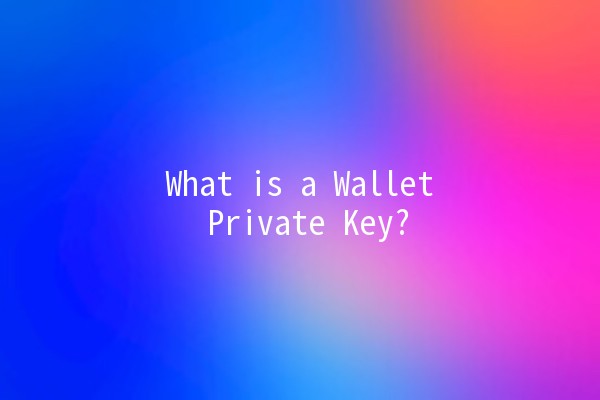
In the world of cryptocurrencies, understanding a wallet's private key is crucial for anyone wishing to manage digital currencies. This article will take you through the ins and outs of wallet private keys, how they function, their importance, and the best practices for keeping them secure. Along the way, we'll explore effective productivity tips to enhance your interaction with cryptocurrency.
Understanding Wallet Private Keys
A wallet private key is a complex string of alphanumeric characters, crucial for accessing and managing your cryptocurrency holdings. This unique key is generated when you create a wallet and is used to sign transactions. Essentially, the private key serves as your digital signature, allowing you to prove ownership of your assets and authorize the transfer of currencies.

How Wallet Private Keys Work
When you make a transaction using a cryptocurrency like Bitcoin, the network requires proof that you own the assets you are attempting to send. This is where the private key comes into play. The private key generates a cryptographic signature that verifies your identity without revealing the actual key itself.
Types of Private Keys
Importance of Keeping Your Private Key Secure
Given that the private key is the key to your cryptocurrency holdings, keeping it secure is paramount. Losing your private key can result in losing access to your entire wallet, and if someone else gains access to it, they could potentially steal your assets.
Best Practices for Private Key Security
Five Tips to Enhance Productivity in Managing Wallets
Managing cryptocurrencies might seem daunting, but implementing a few strategies can streamline the process and boost your productivity.
Invest in reputable wallet management software that provides robust security features and a userfriendly interface. This type of software can help streamline tasks like transaction tracking or portfolio management.
Example: Use software like Exodus or Electrum, which offer intuitive interfaces and additional tools to manage multiple cryptocurrencies efficiently.
Automating backups can prevent the loss of critical data. Many wallets offer settings that allow for automatic backup creation at specific intervals.
Example: Enable the option in your wallet settings to regularly back up your private keys and wallet data to an external device or cloud storage.
The world of cryptocurrency is everevolving, and staying informed about new updates, security practices, and potential scams can improve your ability to manage assets effectively.
Example: Dedicate at least an hour a week to reading cryptocurrency news, blogs, or participating in online communities like Reddit or specialized forums.
Enhance security and convenience with 2FA for wallets that support it. This adds an additional step for authentication during transactions, making it harder for unauthorized access.
Example: Use apps like Google Authenticator or Authy to set up 2FA for your wallet or exchange accounts.
For assets you're not actively trading, consider utilizing a longterm holding strategy. This minimizes the stress and decision fatigue of daily trading, allowing for better focus on security and asset management.
Example: Identify cryptocurrencies that you believe will appreciate in the long run and allocate a portion of your portfolio to these assets, monitoring them periodically while securing your private keys.
Commonly Asked Questions
Losing your wallet's private key means you lose access to your funds permanently. This is because the private key is the only means to prove ownership of your assets on the blockchain.
Unfortunately, if the private key is lost and there is no backup or recovery phrase, recovery is not possible. It emphasizes the importance of secure storage and regular backups.
The safest way to store a private key is in a hardware wallet or cold storage (offline). Additionally, physical copies in secure locations can further safeguard your access.
A public key is shared with others to receive funds, while a private key is kept secret and used to sign transactions, granting access to the associated wallet.
It is not necessary to change your private key regularly, but it is advisable to generate a new keypair if you suspect that your current private key may be compromised.
A multisignature wallet requires more than one private key to authorize transactions, which enhances security. This is particularly useful for joint accounts where multiple approvals are needed.
Cryptocurrency Management
Understanding wallet private keys is fundamental for anyone interested in cryptocurrencies. By applying the practical tips outlined above for productivity, you'll not only secure your assets but also elevate your overall management experience. Embracing these practices will empower you as a more informed and responsible cryptocurrency user, enhancing your ability to navigate the digital currency landscape effectively, all while keeping your assets safe and accessible.

